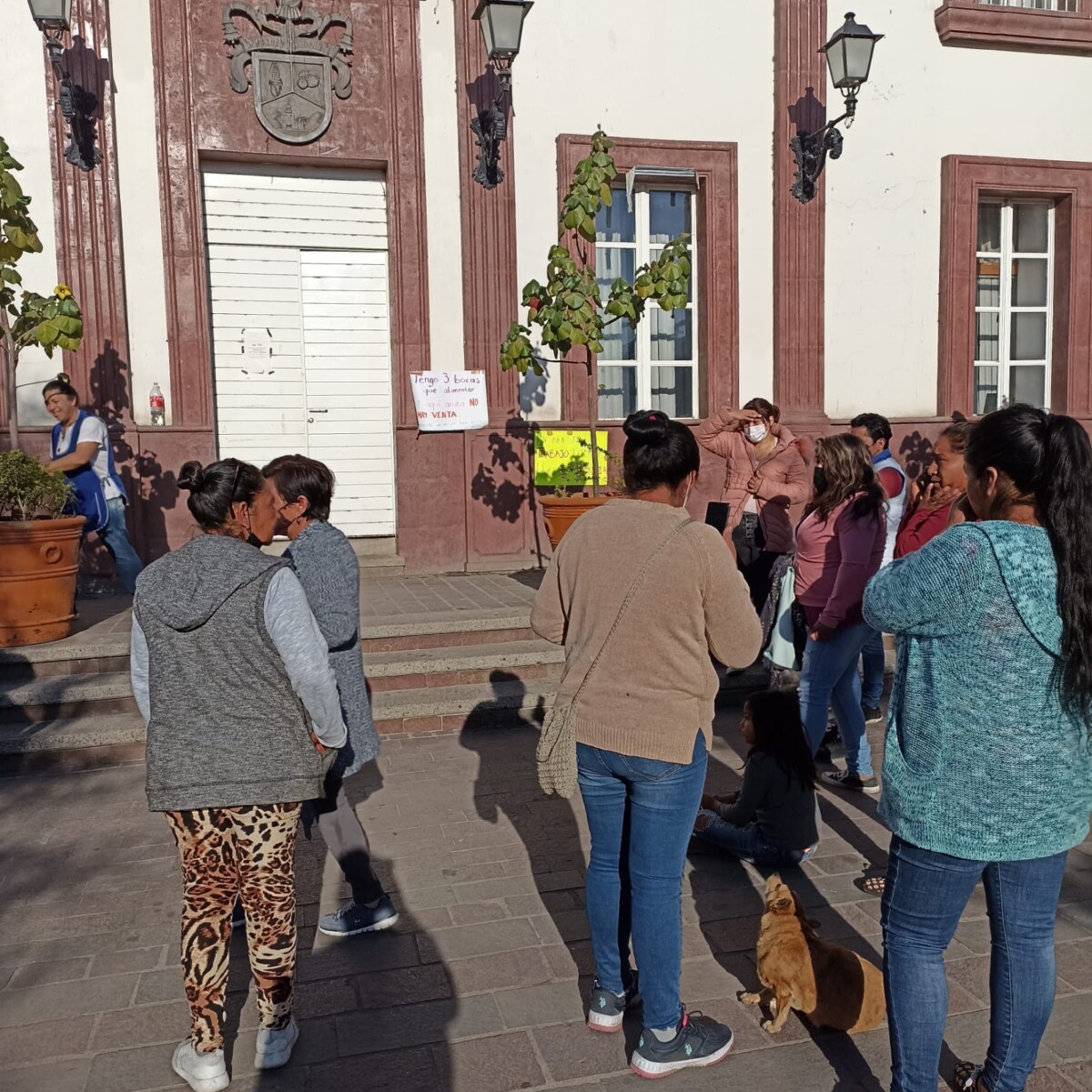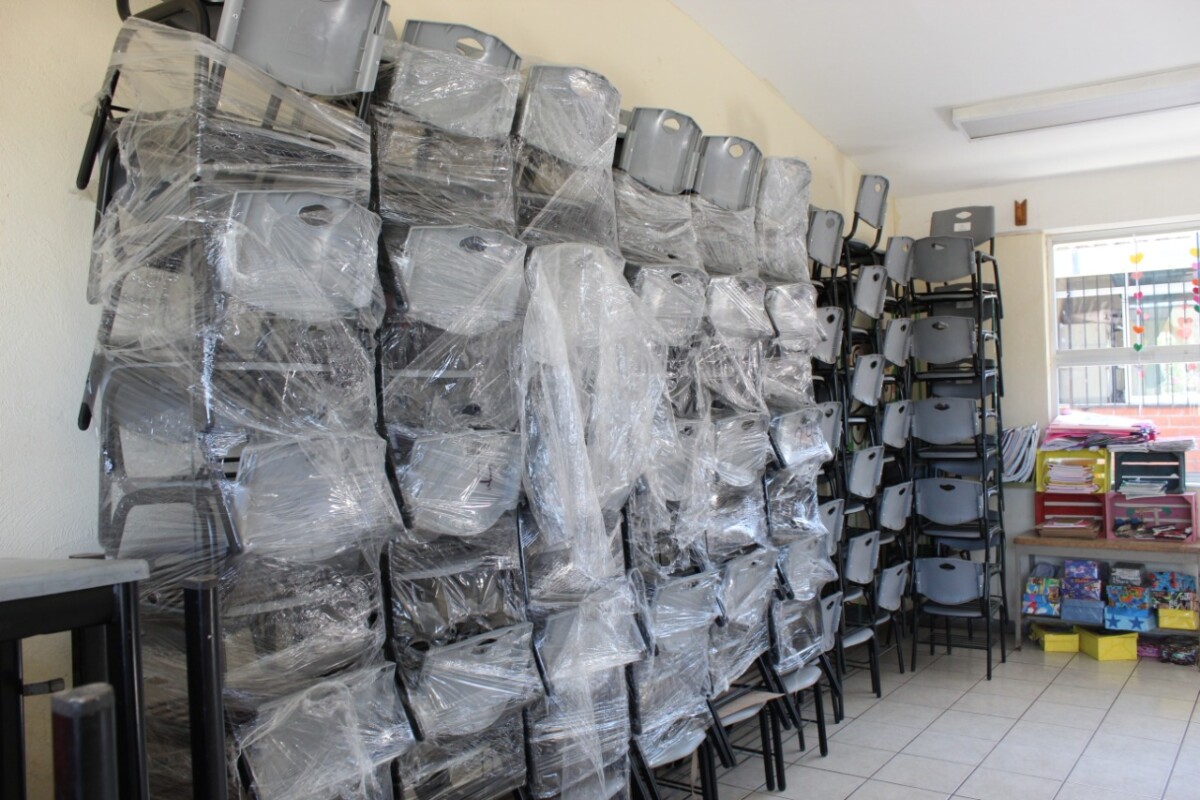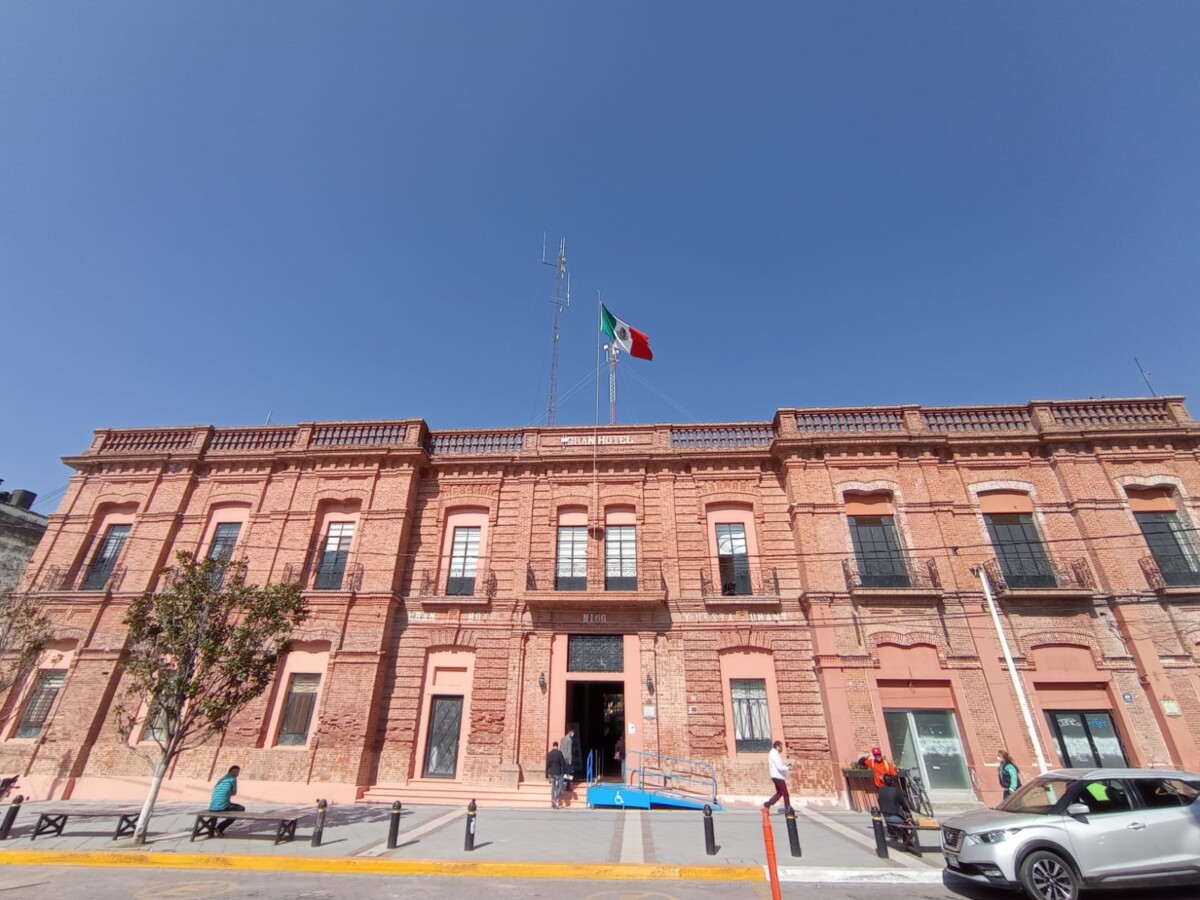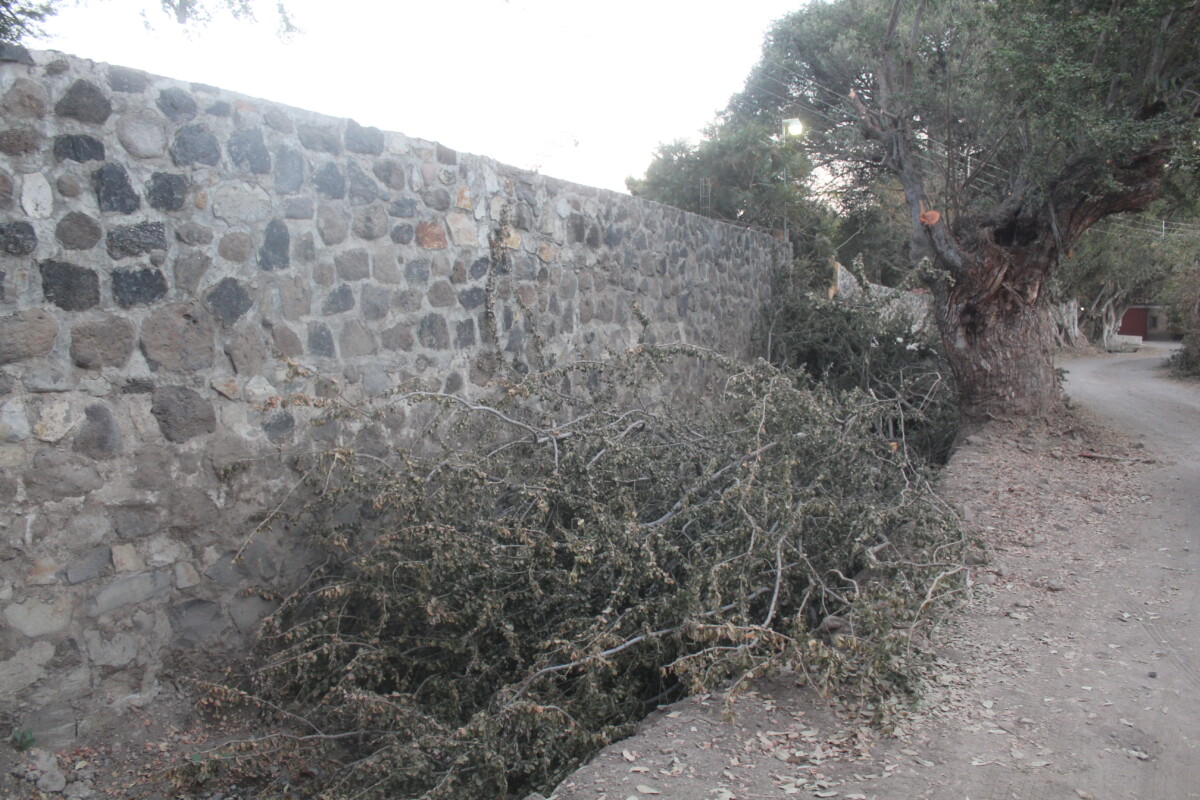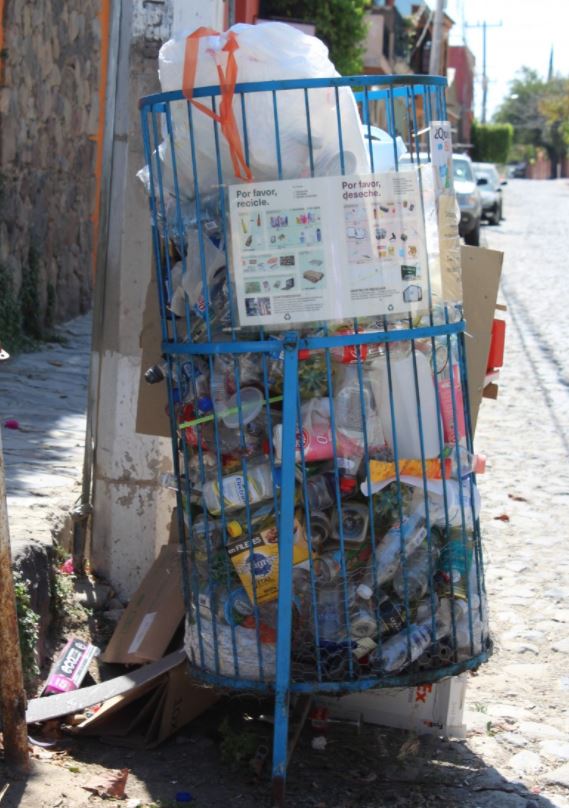en inglés
Merchants protest after being removed from the streets in Jocotepec
First on Morelos street and then in front of the presidency, a group of 15 street vendors demonstrated in Jocotepec. Photo: Miguel Cerna.
Héctor Ruiz Mejía (Jococtepec).- A group of street vendors demonstrated on March 2 on Morelos Street and at the Municipal Presidency of Jocotepec.
A little more than a month after being relocated to the upper part of the market, the 15 dissatisfied merchants said they had low or no sales in the space assigned to them, so they decided to raise their voices to be heard by the municipal president José Miguel Gómez López.
The vendors set up their stalls on the sidewalk behind the DIF building around 7:00 a.m. with the intention of «giving away their products to passersby» in protest.
However, before their arrival, two municipal police patrol cars and at least ten police officers were already waiting for them. Immediately, the uniformed officers blocked the sidewalk and prevented citizens and merchants from selling their products.
An hour later, personnel from the Department of Registration and Licenses arrived at the site and proceeded to remove the merchandise from the demonstrators, their tables and all their work material. Avocados, honey, nopales and sweet bread were some of the products withheld.
«They took away our products, they did not let the people pass by. People wanted to come closer to buy from us, and I was giving them my product. The police did not let us give anything to them, that is unfair,» said Carmen Aguilar.
Demanding to be heard and attended to by Mayor José Miguel Gómez López, the vendors moved to the outskirts of the town where they placed signs with the slogans: «Our family depends on our work» and «I have three mouths to feed and there are no sales up here.»
In the absence of Gómez López who, according to information from the Registration & Licenses staff, was in the city of Guadalajara, the group of protesters was joined by municipal trustee Carlos Alberto Zúñiga Chacón in the Bicentennial Hall at 9:00 a.m.
«What was done today in the morning was a demonstration, not to make disorder as was mentioned (by Registration & Licenses personnel), but to make them listen to us, because the truth is that we all need to work, but to work in a place where we have sales,» said one of the affected merchants.
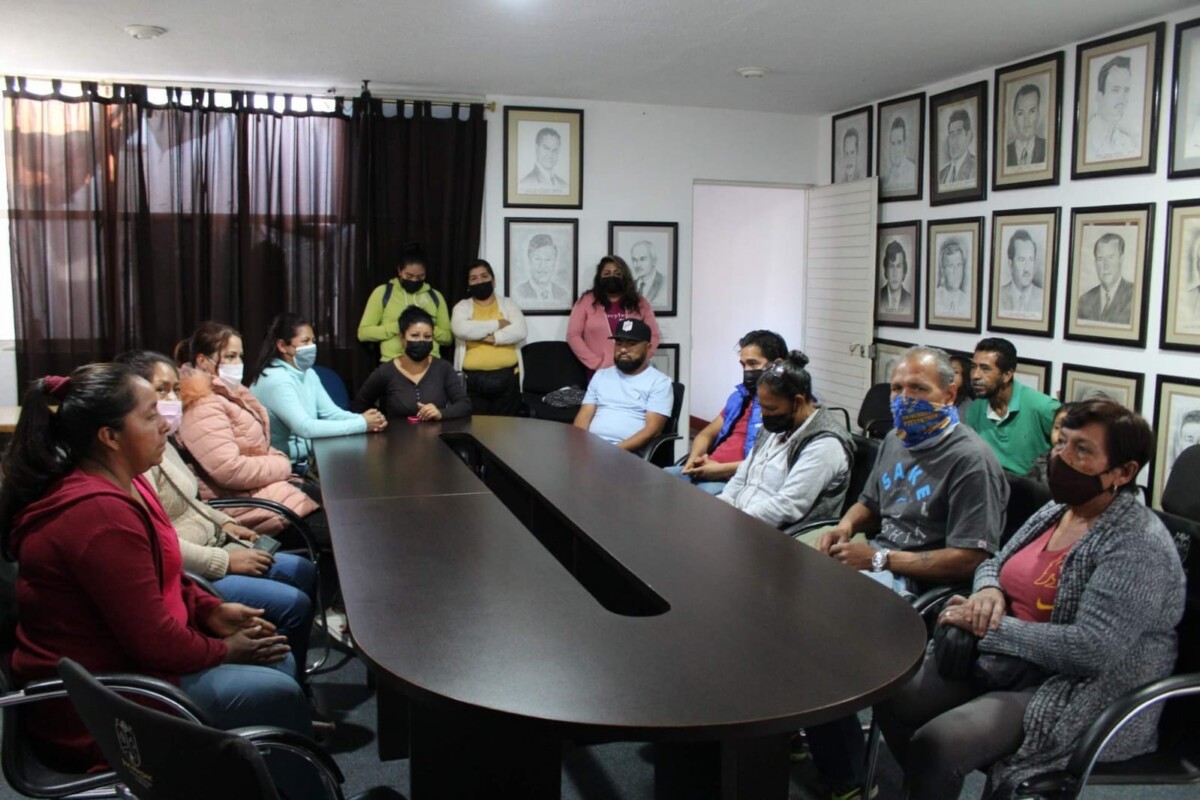
The merchants met in the town hall with Carlos Alberto Zúñiga Chacón, the municipal trustee, after the demonstration. Photo: Miguel Cerna.
In the meeting, the merchants explained to the trustee the economic difficulties that the relocation has brought them due to low sales, and asked for his intervention to reach an agreement that will benefit them as soon as possible.
«We are day after day abiding by their rules, we have not left (the market) at all, and yet there are days when we take home 20 pesos in sales. My two sisters lost their rented houses and now they are living with me; there are 12 children sleeping on the floor and without much to eat,» commented Ana, who sells nopales.
«They don’t want to lend us (money), they have to leave without paying for the food because the children are hungry, do you think it’s fair that we go around scavenging for scraps from the fruit stores to have something to eat?» added Ana.
After listening to their demands, Zúñiga Chacón promised to work on a modification project that would allow the vendors to install themselves on the side of the market on Josefa Ortiz de Domínguez Street, although he clarified to them that there would not be an immediate resolution because the work would have to be requested from the State Government.
«The request that I made for the modification of the stairway on Josefa Street and/or inside the market cannot be made at the moment, since the work needs to be validated by the corresponding state authorities,» the trustee answered to the affected parties on March 3.
So far, the municipal president, José Miguel Gómez López, has not issued any statement on the matter. The merchants are hoping for a favorable resolution to the situation, since the almost null sales have already begun to affect their lives.
«The president can give us a statement whenever he wants, but he should know one thing: we no longer want to be upstairs,» said one of the vendors.
Translated by Sydney Metrick
New furniture for two schools in Jocotepec
The 246 new and ready to install chairs were received last week by the J. Vicente Negrete school. Photo: Courtesy.
Héctor Ruiz Mejía (Jocotepec).– The Jalisco Ministry of Education (SEJ), in coordination with municipal authorities, delivered furniture for two basic education schools in Jocotepec last week.
After 20 years of being overlooked, the J. Vicente Negrete elementary school in El Molino and the Francisco Villa elementary school in La Loma received 711,978.56 pesos (about US$34,000) in school equipment.
The Francisco Villa school received 246 chairs made of ironwork with plastic and 126 binary tables for students, at a cost of 362,743.60 pesos (about US$17,300).
In the case of J. Vicente Negrete, the equipment also consisted of 246 chairs and 126 tables, plus 12 chairs specifically for the teaching staff at a value of 349,234.96 pesos (about US$16,700).
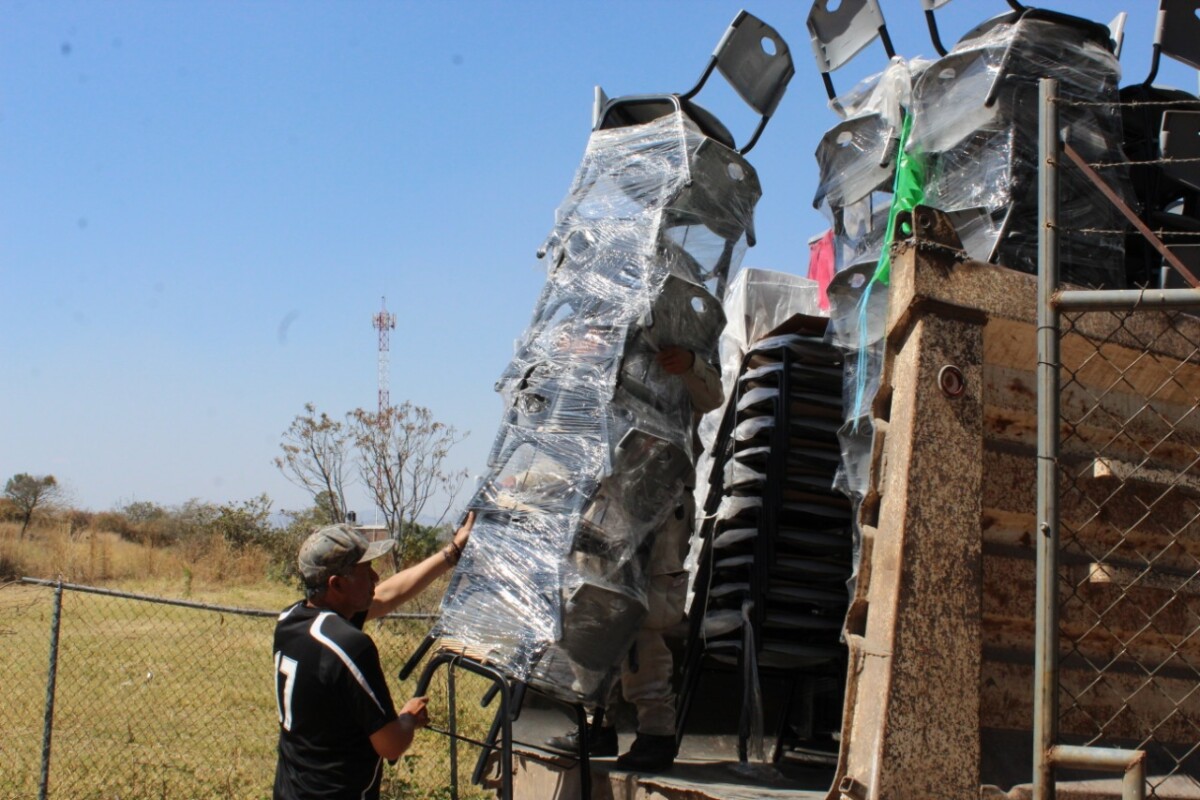
Jocotepec City Hall personnel delivered the furniture to the J. Vicente Negrete school in El Molino. Photo: Courtesy.
«The Ministry of Education provided complete furniture for the elementary school in collaboration with the municipality’s personnel,» stated Ana María Cano Espinoza, director of education of the municipality.
Mayra Berenice García Ramírez, principal of the J. Vicente Negrete school, thanked the authorities for the support and for «finally being listened to,» as she explained that their equipment had not been updated for more than 20 years.
«The children are thrilled with the new furniture, it already feels different. We had been using the same tables and chairs for more than 20 years and they were getting uncomfortable,» she said.
Also, the SSJ provided 160 meters of wiring for the El Molino elementary school because in September 2021 it suffered several robberies that left it without electrical circuits.
Translated by Sandy Britton
Health and Wellness:
By Leticia Trejo
Have you ever had a friend who goes to the gym or jogging every day and even spends weekends exercising? If we dare to make the observation that he has become addicted to physical activity, he might say that at least his addiction is healthy. In this article we will examine the scientific reasons why excessive exercise is not healthy.
Body fat is the body’s most durable fuel. Muscle mass is the body’s most nutritious food. When there is a health emergency, the body takes the most nutritious element and stores the most durable one. For example, remember those old diets where the person ate only apples and water for more than 15 days? This nutrient deprivation caused the body to consume itself, reducing the muscle mass, but leaving the fat. The same happens when we perform an excess of physical activity. Once the nutrients of the day are consumed and are not replenished either with rest or proper nutrition, the body takes the muscle nutrients and leaves the fat as fuel for an emergency such as a long and difficult illness.
This means that with an excess of physical activity there is a loss of muscle mass and accumulation of fat deposits.
Then let’s consider the health of the kidneys. Imagine, dear reader, that your kidneys are a strainer like those we use in the kitchen to filter the syrup from pineapple juice. If the strainer is clogged by excess waste, its function is diminished. The same thing happens to the kidneys. Every activity of our day generates cellular waste, and every hormonal deployment becomes waste that goes into the bloodstream and then is filtered in the kidneys to remove this material in the urine. If we add two or three hours of intense exercise a day, it means that there will be an overproduction of cellular waste the kidneys will not be able to filter and it will begin to suffer damage in its important function. Jalisco has the most cases per capita of renal failure. It can take many years for a person to realize that their kidneys are damaged, it is not something that can be seen with a simple blood test.
Our vigorous friends should take note of some of the symptoms of kidney problems: very strong and unpleasant odor of urine, foam on the surface, very intense to dark yellow color. As well as severe muscle and joint pain, especially in the ankles, heels and toes and excessive exhaustion. If any of these symptoms are present the individual should visit a nephrologist (kidney specialist).
Our health and well-being needs balance; a sedentary lifestyle brings no good, but neither does excessive physical activity. I wish you a great weekend and a long and healthy life.
Translated by Christalle Dalsted
Parade attendees aggressively demanded the traditional ‘Toro de Once’
People protested in front of the Lienzo Charro (rodeo ring) de Ajijic, located on Revolución street, to demand its opening. Photo: Sofía Medeles.
Sofía Medeles (Ajijic).- People who attended the sayacas parade last Sunday, February 27 pounded on the gate, threw rocks and shouted , demanding to enter the Lienzo Charro (rodeo ring) de Ajijic, waiting for the «Toro de Once», a traditional charro rodeo that normally follows the parade.
Despite the fact that the Ajijic Charros Association had previously announced that this year the charreada would be canceled by agreement of the members of the association, the spectators followed the parade participants to the Lienzo Charro.
When their access was denied, a group of more than 100 people protested at the gates of the venue to demand to be let in, thinking that there was to be a private celebration. The president of the Charros Association, Ernesto Perez Reyes, who was present, confirmed the cancellation of the «Toro de Once,” for which he received verbal abuse and pressure from the crowd, who demanded access.
Perez Reyes clarified the reasons for not holding the tradition, as well as the reception, citing the restrictions imposed by the Covid-19 pandemic.
«The planning time was very short. The green light was only given a week and a half before, so there was no opportunity for planning the event. Another reason were the capacity restrictions, due to Covid, in venues where events are held, as in the case of the Lienzo.»
The representative of the charros explained that the permitted limit is 70 percent of the site’s capacity and, if the state restrictions are ignored, there could be consequences such as citations, fines, and even closures or limitations on future events.
Under this logic, because the «Toro de Once» is an event that packs the Lienzo Charro to overflowing, the association decided to omit the event entirely so as not to exclude anyone from the tradition.
«It is a measure that was taken due to the restrictions of the pandemic and the lack of time, but the charros hope that next year it will be better organized, with all the tradition that has led us to be a Pueblo Mágico. Also, on behalf of the Association, we thank the participants, those who understood the situation, and those who did not understand as well, for continuing to be part of the customs of Ajijic,» concluded Pérez Reyes.
Translated by Sandy Britton
Renovation approved for Avenida Madero, one of Chapala’s main street
Chapala Mayor Alejandro Aguirre Curiel (left), with Congresswoman Claudia Murguía Torres and the Chief of the State Cabinet, Hugo Luna, after the mayor was informed of the repair approval.
Editor. – Chapala Municipal President Alejandro de Jesús Aguirre Curiel has announced approval of a Renovation of Urban Image project for the main street in downtown Chapala. Plans call for cobblestones to be replaced with hydraulic cement. Sidewalks and curbs will also be improved.
“I am very pleased that after presenting joint work projects with the government of Jalisco and the municipality, and thanks to the management of Congresswoman Claudia Murguía Torres, today the Chief of State Cabinet, Hugo Luna, has confirmed to me that the projects were accepted,” Aguirre posted on social networks.

The Public Works Department of the Municipality of Chapala closed part of Avenida Francisco I. Madero at its intersection with Paseo Ramón Corona in May 2019 to build a crosswalk.
“One of the most important projects is the renovation of Avenida Madero. The cobblestone will be replaced by hydraulic concrete, plus the sidewalks and curbs will be replaced,” he added in his March 2 posting.
In his message he thanked Jalisco Governor Enrique Alfaro Ramírez and assured that, “with this support and coordinated work our city and delegations will have better infrastructure that will be good for tourism in the state.”
Chapala Director of Social Communication Elizabeth Oropeza said the municipality is waiting for the state’s Secretary of Infrastructure and Public Works to present the project, which will be adapted by the state agency to the needs of the population.
Translated by Mike Rogers
Public works projects debt approved
Chapala City Hall building where on February 28th the councilmen approved the 7.9 million pesos debt.
Arturo Ortega (Chapala).- The Chapala City Council approved a debt of 7,912,060 pesos (about US$378,000) plus interest to fund public works in priority areas of the municipality, during the sixth ordinary council session held on February 28.
The debt, to be paid over a period of three years, will be contracted with the banking institution that submits the proposal with the lowest interest rate. This debt will finance public works specified in the catalog of actions established in the guidelines of the Contribution Fund for Social Infrastructure (FAIS) issued by the Welfare Secretariat.
Prior to the approval of the proposal, the Mayor of Chapala, Alejandro de Jesús Aguirre Curiel, explained that the resources will be invested in infrastructure projects including drainage, potable water, education and street rehabilitation works, which are considered a priority in Ajijic and Atotonilquillo.
Translated by MaryAnne Marble
Residents of La Cristina denounce neglect by authorities
After a pruning, CFE personnel left the branches in the creek of Las Garzas street in La Cristina Photo: Sofía Medeles
Sofía Medeles(Ajijic).– Residents of La Cristina, a neighborhood located to the west of Ajijic, denounced the lack of cleanup work after the mudslides of October 2021.
The complaints are mainly related to the silting of the creek on Las Garzas Street, in addition to the pruning work carried out 15 days ago by Federal Electricity Commission (CFE) personnel, which left the branches in the creek.
Other problems mentioned by affected residents were the spillage of sewage into the stream, and the encroachment on private property of debris from the landslide left by state cleanup crews after clearing.
«They have not cleaned the street well, nor the creek. With the sewage spill and the garbage dump left by the CFE workers, it is obvious that they do not pay attention to this side of town,» commented one of the inhabitants of La Cristina.
The person in charge of the office, Maximiliano Macias Arceo, acknowledged responsibility and said that they had been made aware of the problems from complaints that they have received.
«We are aware of the encroachment of debris on private property, as well as in the creek. In the next few days, we will carry out the necessary survey to file an official report so that crews and equipment will be sent to clean La Cristina, as well as the many streams that need to be cleared in the western zone of the township. We are going to work fast, to ensure that the creeks are cleared before the rainy season arrives to prevent further tragedy,» shared Macías Arceo.
Finally, regarding the sewage spill, Macías Arceo gave assurances that both he and the Department of Ecology are already attending to the problem. He also provided the telephone number that the public can use to report complaints of this type: 376-765-8025.
Translated by Rebecca Zittle
Two Lakeside women recognized on International Women’s Day
María Guadalupe Urzúa Flores was twice mayor of Jocotepec.
The Jalisco State Congress will recognize María Guadalupe Urzúa Flores, from Jocotepec, and Martha Rodríguez García, from Chapala, with the «Hermila Galindo Acosta» award on March 8th, International Women’s Day.
The Commission for Substantive and Gender Equality of the Congress of the State of Jalisco approved honoring ten women from the state, and one civic organization, for their actions in favor of women’s human rights through teaching and research, public service, art and culture, health, gender equality, or civic advocacy.
María Guadalupe Urzúa Flores will receive this distinction post mortem. She was a woman who did not think of herself. Although she did not have material wealth, nor did she marry, she dedicated her entire life to the service of others.
Among her actions as mayor of Jocotepec for two terms were overseeing the installation of cobblestone streets, water wells, roads, electricity, a sports courts, a library, a women’s training academy, a night literacy school for adult men and women, a hospital, the leprosarium, the «Pedro Ogazón» elementary school, the «Miguel Hidalgo y Costilla» high school, and the current regional high school.
Urzua Flores was a friend of several presidents of the republic and governors of Jalisco. She was the first federal deputy for Jalisco from 1955 to 1958 and she was elected to four federal deputies, which allowed the needs of the people to be heard through her voice and her administration.
She was also mayor of San Martin de Hidalgo and managed to establish a high school, recognized by the University of Guadalajara.
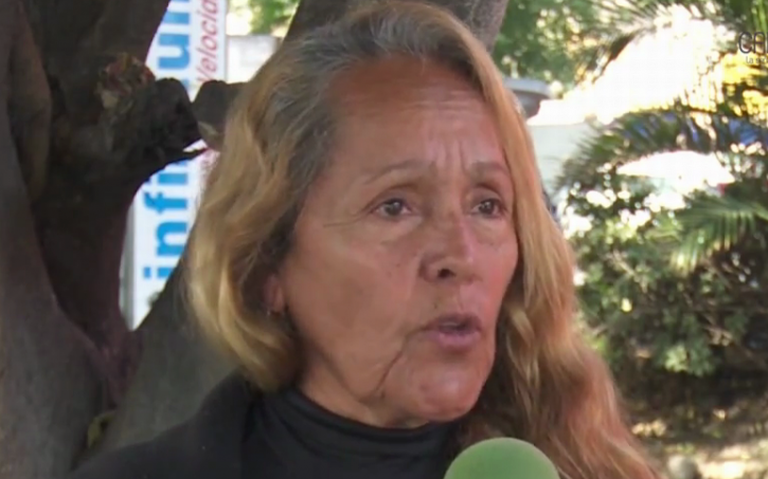
Martha Rodríguez García is a rural social environmentalist leader in the Chapala region.
Another Lakeside woman who will also be recognized on March 8th is Martha Rodríguez García. She is an environmental leader and representative of the rural Lakeside community. She has committed herself to the defense of the environment, rural values and traditions of her community. Her skills and talents were recognized when she was elected as President of the Commissariat of her town in Santa Cruz de la Soledad, municipality of Chapala.
Martha Rodríguez warns all that the growth of an urban development and tourism model is occupying the spaces of the agricultural territories worked by the “ejido” or communal landowners and indigenous people. They have been displaced by real estate and by external interests that are alien to the traditional communal structure. The social fabric of her ejido was damaged because of new real estate development projects.
From her position as an ejido communal landowner, Martha took on the task of compiling a documentary file that traced the history of the community from the endowment of land in 1919, its expansion in 1925 to include164 hectares. 145 of those hectares belong to the Cerro del Junco, a hill that is home to important species of flora and fauna, and from whose summit the Colima Volcano can be seen.
With this documentation in hand, Martha has undertaken defending the heritage of her community. She has worked to decree the land as a Natural Protected Area, guaranteeing that the ejido’s will will be followed. She also has worked for the integration of an Ecological Land Management Plan for the Lake Chapala Lakeshore in the hope it will attract projects, such as those developed with technical assistance and support from Aipromades Lago de Chapala, obtain funding from the United Nations Development Program for the restoration of Cerro del Junco, and the participation of the Coca-Cola Foundation and Arca Continental as partners in the project.
Translated by Colleen Beery
Ajijic recycling negotiations move ahead
Full cesto destined for the Ajijic Recycling Center.
Patrick O’Heffernan (Ajijic).– In a meeting between Esther Parada of the Ajijic Recycling Center and Chapala Council members and officials Thursday, March 3, the municipalidad agreed to reactivate the government committee needed to move head with the steps required for full operation of the recycling center.
The Center is currently operating at reduced capacity because its compactor – a machine needed to reduce the recycled materials for transportation to market – has not been installed and connected to electric power. The Recycling Committee will be able to address this and other needs of the Center when it is appointed.
“Yes, we want to see a strong recycling program in Ajijic,” Director of Ecology María Guadalupe Vázquez Solano told Laguna in an interview the day before the meeting, indicating that the next step was reconstituting the recycling committee.
This will be the third attempt to operate a robust recycling program in Ajijic; the last one was stymied by the previous administration. A current sticking point has been the ownership of the building, a former military training center, and the fact that it never received an address. Without an address CFE cannot set up an account to run electricity to the building to operate the Center’s compactor, bought 18 months ago with donated funds.
According to Recycling Center officials the compactor is critical for the transportation of plastics to market. Currently they are trucked to Guadalajara in small batches which is very expensive; a compactor would make transportation up to ten times more efficient, according to Recycling center leaders. Additionally they want to ensure that they have full ownership even after the compactor is installed as part of a new agreement to use the building.
Vázquez Solano told Laguna that the government is working on the problem of an address and the delay has simply been because of logistics – many steps needed. She also told Laguna that the government intends to provide the Recycling Center with an agreement that specifies that it owns the equipment, including the compactor, clearing the way for its installation.
The meeting included General Secretary Lilia Alvarado Macías, Councilman Jesús González Amezcua, Acting Ajijic Delegate Maximiliano Macías Arceo , Director of Tourism Paola de Watterlot , Ajijic Recycling Center Representative Esther Parada, and Ecology Director María Guadalupe Vázquez Solano.
In addition to the administration’s moving ahead with the Recycling Committee , Chapala President Aguirre reinforced his commitment to the Chapala environment at a meeting Thursday, March 3, with the Secretary of Environment and Territorial Development, Sergio Graf Montero to discuss an Organic waste separation project. Creation of an Integral System of Intermunicipal Waste Management (SIMARI), cooperation with CONAGUA and SEMADET to solve the problem of green algae in Lake Chapala, and setting up links to generate the breeding and growth of different types of fish in Lake Chapala.
Looking at Life in Lakeside
By Patrick O’Heffernan
By now, you have probably heard of Paola Schietekat Sedas, a Mexican citizen working for the World Cup Organizing Committee in Qatar. If you haven’t heard about her, it is an appalling story with a warning for the soccer loving world, especially Mexicans.
Schietekat Sedas had to be spirited out of Qatar on June 25 last year after being raped by one if her fellow World Cup staffers, a Columbian. She reported the rape to the police the next day, accompanied by the Mexican Consul. When asked by the police if she wanted to press charges, on the advice of the Counsel, she said yes. That’s where things got appalling.
She went from victim to criminal, charged with the crime of sex outside of marriage. The police demanded she take a virginity test (after being raped???) and demanded to search her phone for romantic messages with the rapist or anyone else. She was arrested and charged with extramarital relations, a crime punishable by 100 lashes and 7 years in prison.
She was released pending trial, and the World Cup Organizing Committee snuck her out of the country. The Mexican Foreign Ministry will defend her at trial in absentia, but, needless to say, she’s not coming back to her job. She also noted that the Mexican Embassy in Qatar had no Arab speakers and no knowledge of Qatari law and could not be helpful.
The incident is a warning to anyone, especially Mexicans, who plan to attend the World Cup. If you were thinking of spending an exciting week sharing a hotel room with your girlfriend or boyfriend seeing the Cup live, forget it – 100 lashes and 7 years in prison. If you are gay, 3 years in jail. No kissing, drinking, dancing, hugging, or shorts in public.
How did a country that treats women like a cross between livestock and sex slaves, that jails gay people, that brutally whips girls who are raped, get the world Cup in the First Place? According to the US Justice Department, they did it with massive bribes to FIFA officials.
After years of investigations into corruption, abuse of migrant workers and women and other human rights crimes, on April 6, 2020, the Justice Department indicted three media executives and a sports marketing company for bribing FIFA officials. How much money are we talking about? A cool $400 million was offered to FIFA for “broadcasting rights” 21 days before FIFA announced that Qatar will hold the 2022 World Cup.
So here we are, 7 months from the Cup; a Mexican woman is on trial for the crime of being raped and threatened with a brutal, potentially fatal beating and 7 years in jail, and a Mexican Embassy unequpped to deal with local authorities and whose advice got her indicted.
The Mexican government needs to shape up and step in.
The President should issue a warning to its citizens not to attend the World Cup, especially if they are single, gay, or a male looking for a good time (no prostitutes and booze only in your hotel or a restricted fan area) or a married or single woman who can be raped with impunity and beaten and jailed for reporting it. Other Latin countries should issue the same warning. Defending Schietekat Sedas in the Qatar kangaroo court is a good first step, but México needs to train the Embassy staff in Qatar to protect its citizens from a vicious 12th century government.
Westerners attending the World Cup will be abused by the Qatar government; it is their law and their culture. Unwitting gays, cohabiting couples, and errant beer drinkers will be caught and punished, some violently. It is inevitable, given Schietekat Sedas’s treatment. The Mexican government needs to honor Schietekat Sedas by telling its citizens and those of other Latin countries don’t attend the World Cup. It’s on TV here with beer, tequila and your significant other.
© 2016. Todos los derechos reservados. Semanario de la Ribera de Chapala
